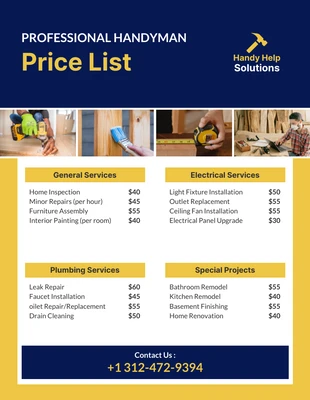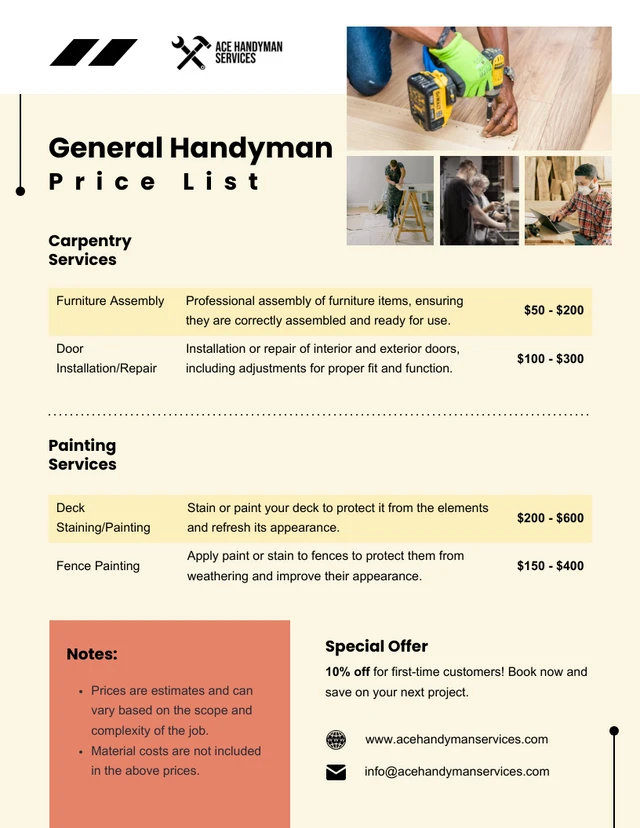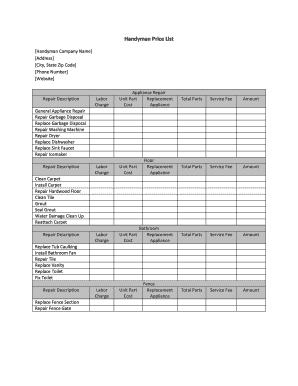Featured
Table of Contents
- – Indian Trail, NC Emergency Handyman Service: W...
- – Indian Trail, NC 24 Hour Handyman Service: Pri...
- – Understanding Handyman Service Pricing In Ind...
- – What Should An 24 Hour Handyman Service Cost ...
- – Indian Trail, NC Emergency Handyman Service R...
- – Ongoing Emergency Handyman Service Costs In I...
- – Indian Trail, NC Handyman: Price Vs. Quality
- – Winter 24 Hour Handyman Service Deals In Ind...
- – Reviewing Indian Trail, NC 24 Hour Handyman ...
- – Reliable Handyman Service In Indian Trail, N...
- – Indian Trail, NC Emergency Handyman Service ...
- – Indian Trail, NC Handyman Warning Signs: Pri...
- – Get Budget Handyman In Indian Trail, NC
Handyman hourly rates are $50 to $80 for self-employed professionals and $75 to $125 per hour for a corporate handyman, plus products. Handypersons without insurance or those in rural areas charge $35 to $65 per hour. Handyman expenses depend on area, task complexity, and experience. Handyman per hour rates - chartHandyman per hour rates Type Per hour rate * Self-employed Business * Rates not consisting of products, minimum charges, or trip charges.
Indian Trail, NC Emergency Handyman Service: What To Budget

Handymen who buy products might have a 20% to 50% markup or a journey charge of $30 to $80. Many states require handymen to have a license for tasks over $500 to $10,000 and insurance to secure against damage or mishaps. Bundling several tasks together saves cash. Prepare a detailed list ahead of time to conserve the handyman time.
Indian Trail, NC 24 Hour Handyman Service: Price Vs. Quality
A handyman does not anticipate a pointer. Get complimentary estimates from handyman services near you. Little handyman repairs cost $100 to $500 for 2 to 5 hours of work. Larger setup jobs that draw from 5 hours to a couple of days cost $500 to $1,500+. The following table is a flat-rate handyman rate list by service.
Understanding Handyman Service Pricing In Indian Trail, NC

Handymen who purchase parts or materials may also charge a 20% to 50% markup. Some handymen enable the house owner to buy the products before they show up.
What Should An 24 Hour Handyman Service Cost In Indian Trail, NC?
High-end products can increase the total expense considerably, particularly for large tasks. Explain the task and materials required in detail and send out images so the handyman comprehends the tools and materials required before arriving. A handyman charges more in areas with a higher cost of living. States such as New York City, California, and Massachusetts normally cost 20% more than other areas.
Indian Trail, NC Emergency Handyman Service Reviews And Pricing
* Per hour rates reported by homeowners in each area. Many states have a "Handyman Exemption" that only requires a license for tasks over $500 to $10,000+, varying by state - handyman. In other states, a license is necessary for all work. Many states likewise need worker's settlement and liability insurance coverage to protect versus damage or mishaps.
Ongoing Emergency Handyman Service Costs In Indian Trail, NC
A handyman is either independent or works for a corporate franchise, such as Mr. Handyman or Handyman Connection. A self-employed handyman usually has more economical hourly rates, while corporate handymen are vetted, licensed, and insured by the business. Business vs. self-employed handyman Type Pros Cons Normally more economical rates due to lower overhead Flexible in pricing terms More likely to go above and beyond given that their reputation is on the line Work is not subcontracted out Capability to establish a continuous working relationship Might not have insurance coverage You have to validate their certifications and reputation yourself All complaints go directly to the handyman instead of the primary workplace Companies confirm the handyman's background and certifications Companies maintain insurance and licensing Companies use a workmanship guarantee Any problems go to the business instead of the handyman Costs are typically higher, not flexible, and are set by the company A different handyman might get here each time A corporate handyman is less most likely to go above and beyond Secure free price quotes from handyman services near you.
Indian Trail, NC Handyman: Price Vs. Quality
Handyman charges $75 to $100 per hour on average, depending upon the franchise location. Some Mr. Handyman franchise rates are as high as $229 for the first two hours. Mr. Handyman is totally insured and takes credit card payments. Plus, they use a "done right guarantee." A handyman generally has flexible terms to either accept payment on a per hour basis or as a flat rate per project after completing the job.
Winter 24 Hour Handyman Service Deals In Indian Trail, NC
A handyman does not expect an idea. When using a handyman regularly, offer them a $15 to $50 pointer once a year throughout the holidays to show your gratitude for their tough work. If a handyman offers outstanding service above and beyond your expectations, consider tipping $10 to $20 on the spot.
Reviewing Indian Trail, NC 24 Hour Handyman Service: Which One Is Right
Handymen charge by the hour or task and are typically more affordable than a specialist. Accredited contractors work on jobs with a bidding process and allows, such as electrical, pipes, and renovating work. A handyman can do little pipes and electrical work that doesn't require licensing or licenses. Pipes A handyman can change a toilet or faucet, or unclog a drain, however can not customize lines.
Reliable Handyman Service In Indian Trail, NC: Reviews
Get free estimates from handyman services near you. A handyman makes $30,000 to $60,000 per year, depending on their per hour rates and time worked.
Indian Trail, NC Emergency Handyman Service Honest Pricing

Here's the finest method to discover a reliable handyman: Make a detailed list of what you need done. Set a budget plan for each job. Find handymen on Google, HomeGuide, or ask your good friends, family, and next-door neighbors. Get quotes from at least three handymen to compare. Ask questions about their experience, licensing, and insurance.
Indian Trail, NC Handyman Warning Signs: Pricing Edition
Get the detailed agreement in writing. Pay after the job is total. A lot of handymen provide free expense price quotes or have a flat-rate rates sheet. Get at least 3 quotes to compare. Ask good friends, family, and neighbors, consult the local hardware store, and use review websites like HomeGuide to get quotes.
Get Budget Handyman In Indian Trail, NC
Select business that are guaranteed, bonded, and have been in business for 5+ years. Discuss rates and payment techniques up front. Get a full breakdown of all labor and product expenses involved.
Table of Contents
- – Indian Trail, NC Emergency Handyman Service: W...
- – Indian Trail, NC 24 Hour Handyman Service: Pri...
- – Understanding Handyman Service Pricing In Ind...
- – What Should An 24 Hour Handyman Service Cost ...
- – Indian Trail, NC Emergency Handyman Service R...
- – Ongoing Emergency Handyman Service Costs In I...
- – Indian Trail, NC Handyman: Price Vs. Quality
- – Winter 24 Hour Handyman Service Deals In Ind...
- – Reviewing Indian Trail, NC 24 Hour Handyman ...
- – Reliable Handyman Service In Indian Trail, N...
- – Indian Trail, NC Emergency Handyman Service ...
- – Indian Trail, NC Handyman Warning Signs: Pri...
- – Get Budget Handyman In Indian Trail, NC
Latest Posts
Veteran Discounts On Handyman Repair Service In Eastvale, CA
Compare 24 Hour Handyman Service Prices In Claremont, NH
Miami Lakes, FL Handyman Cost Guide: What You Need To Know
More
Latest Posts
Veteran Discounts On Handyman Repair Service In Eastvale, CA
Compare 24 Hour Handyman Service Prices In Claremont, NH
Miami Lakes, FL Handyman Cost Guide: What You Need To Know